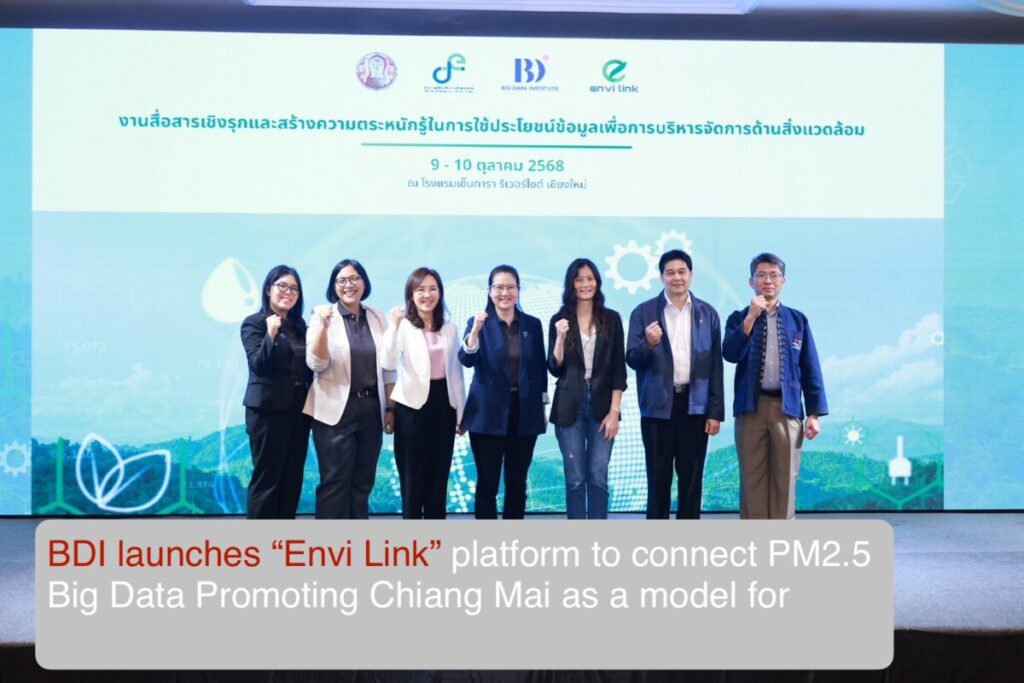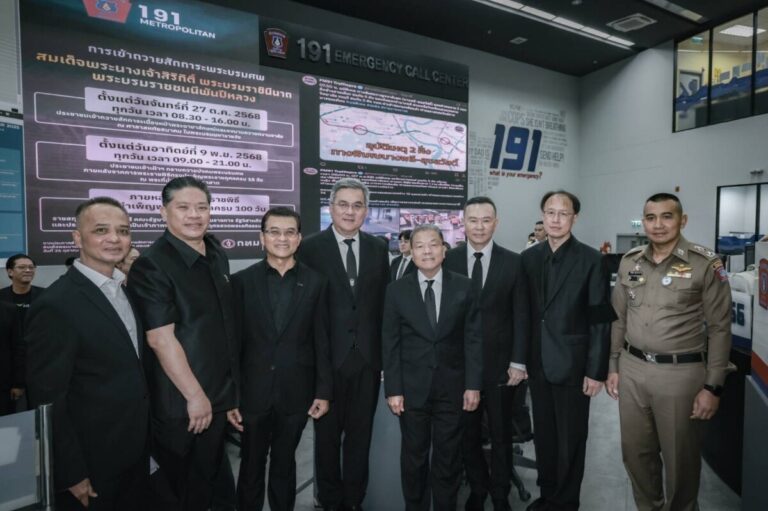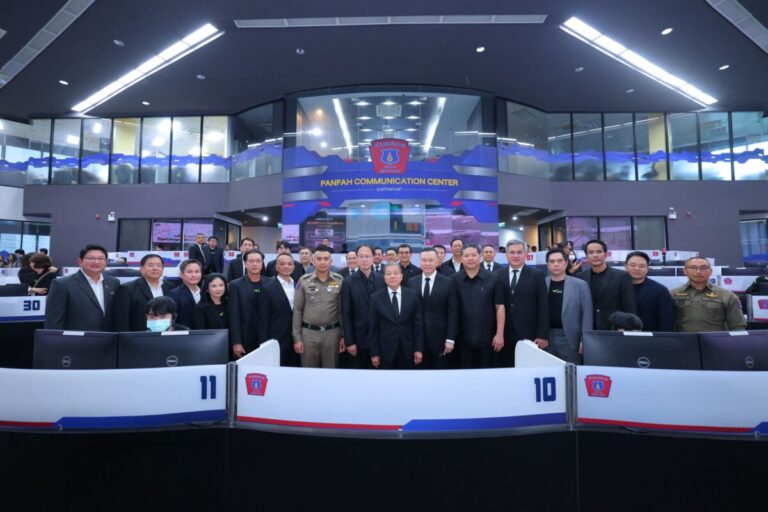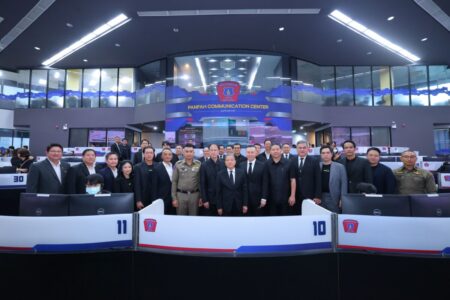Big Data Institute (Public Organization) or BDI, under the Ministry of Digital Economy and Society, is developing “Envi Link”, a national environmental data platform that uses Big Data technology to connect and analyze data from over 30 agencies nationwide, totaling over 200 data sets, to support systematic management of the fine dust problem (PM2.5). Chiang Mai Province has been selected as a pilot area for driving “data-driven environmental management” to improve air quality, quality of life, and long-term sustainability of the city.
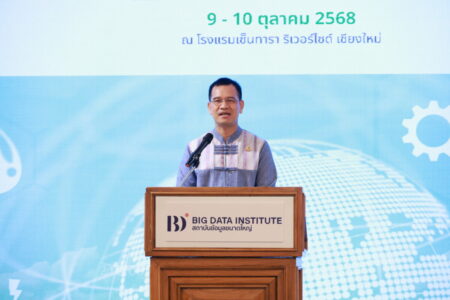
Sivakorn Buapong, Deputy Governor of Chiang Mai Province, says that Chiang Mai has been an area with continuous challenges in terms of air pollution and PM2.5 dust for many years. The introduction of a connected data system like “Envi Link” is a game–changer for local environmental management. This is because it provides the province with more in-depth and accurate information to assess the situation, as well as plan and implement measures promptly. In particular, the use of data dashboards allows executives to track the actual situation in each area, analyze trends, and systematically evaluate performance based on data-driven decisions.
The Deputy Governor adds that the cooperation between the province and BDI is not only about using data technology to help solve the smog problem, but also serves as a model for a “clean air city” where the public, private, educational, and public sectors can use the same data to monitor the situation and work together to plan and prevent problems in a participatory manner. This is considered an upgrade to proactive environmental management driven by real data and cooperation from all sectors.

Prof. Dr. Tiranee Achalakul, Director at Government Big Data Institute (Public Organization) or BDI, says that BDI is committed to harnessing the power of Big Data and Artificial Intelligence (AI) as key mechanisms to drive the economy and society in all dimensions, including environmental management, which is the foundation of the country’s quality of life and sustainability. The integration of over 200 data sets through the “Envi Link” platform is key to creating a centralized information system that connects various agencies, including government, researchers, businesses, and communities, to enable accurate and targeted policy decisions.
The BDI Director adds that “Envi Link” is an integrated data platform for sustainable environmental management, collecting data from multiple dimensions, such as dust values, heat points, burning areas, requests for electricity in the Fire-D system, and the situation of patients suffering from air pollution.It also includes data from air quality sensors from various agencies, enabling administrators and local authorities to access updated and linked information in real time, leading to accurate and timely problem management. “Envi Link” has been further developed into a central database platform to support the management of PM2.5 dust particles nationwide, according to the opinion of the working group to develop a central database platform to support measures to reduce air pollution (PM2.5dust).
In the future, BDI plans to collaborate with local researchers to expand the use of the “Envi Link” platform to 8 provinces in the upper northern region. This aims to create a regionally connected environmental information system, supporting spatial policymaking, forest fire management, and sustainable PM2.5 dust reduction.
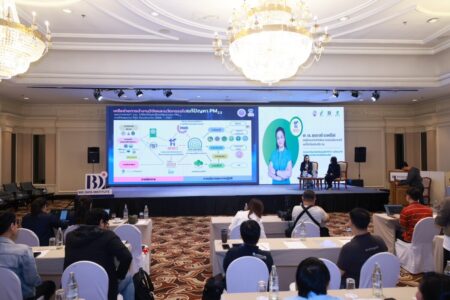
For the project to develop a data catalog system and a prototype for integrating PM2.5 dust data, it has been supported by the Science, Research and Innovation Fund (SRIF) under the management of the National Research Council of Thailand (NRCT), with the main partners including Chiang Mai University (CMU), Highland Research and Development Institute (Public Organization) (RDDI), and Geo-Informatics and Space Technology Development Agency (Public Organization) (GISTDA), and Thailand Institute of Scientific and Technological Research (TISTR). Each plays an important role in developing an environmental data catalog system that can collect, store, and analyze data systematically and transparently to serve as a central database for determining environmental policies and sustainable urban development.

The “Envi Link” platform also provides more than 15 analytics dashboards, including a provincial dust management indicator dashboard that compiles data on hotspots, combustion areas, the number of days with dust levels exceeding the standard, and the number of air pollution-related illnesses, to monitor and evaluate government measures; a dashboard that compares the area of fire requests through the Fire-D system with the actual burned area to analyze the relationship between the area of fire permits and the area of actual burns at each time period; as well as a real-time air quality dashboard that compiles data from multiple sources such as RGUARD, DustBoy, Air4Thai, DPM Alert and Check Dust to enable citizens to closely monitor the situation and better understand spatial data.
In addition, BDI is preparing to further analyze data from “Envi Link” to support research and policy in other related dimensions, such as tracking burned areas by economic crop type from satellite images, recommending areas with high potential for vegetation modification to reduce burning and increase economic value using geospatial information, leading to sustainable burning reduction policies.
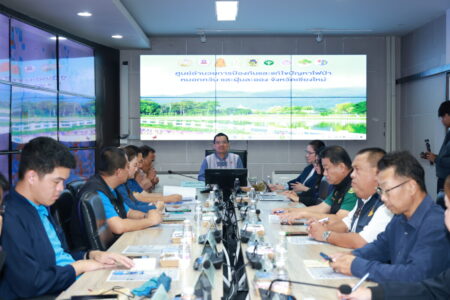
“The operation in Chiang Mai Province is therefore not only the beginning of integrating environmental data, but also an important step in driving “Smart Environment” under the government’s Smart City policy. The goal is to make data an important tool for policy design, natural resource management, and sustainable quality of life creation for citizens in all dimensions.” Dr. Tiranee concludes.

